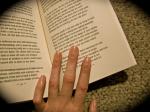Contemplations While Sitting on The Porch Snapping Green Beans
 Only in an advanced society do we remove the tip ends of beans.
Only in an advanced society do we remove the tip ends of beans.
Some say this unnecessary practice removes important nutrition and fiber. High-end restaurants often leave the tips for the sake of being fashionable. But I break them off because they tend to be woody and I don’t like the texture.
A former neighbor of mine, a lady from the Philippines, was incredulous that anyone would be so wasteful. And she was right; it’s throwing away good food. Nevertheless, I do it.
Years ago, while helping me harvest an unusually dismal crop of potatoes, my oldest daughter (then in 4th grade) observed, “This is like the Irish potato famine.” She’d learned about that calamity in school, and I was pleased she remembered it and could relate what she’d learned to the situation at hand.
I agreed there were similarities put pointed out that in our case, we could buy potatoes from the store and wouldn’t have to go without. Moreover, we had other things to eat as well. The common Irishmen at that time ate little else, so when their crop failed, it meant starvation.
“So what did they eat?” she asked.
“Nothing,” I said. “Or at least, very little. They starved.”
She frowned, perplexed. “So… what did they eat?”
In her world, starving to death meant you’d missed lunch. She couldn’t wrap her mind around the alien concept of dying of hunger.
As I sit here with my lap full of beans, not to mention a pantry, two refrigerators, and a 25-cubic-ft chest freezer full of food, neither can I.
We can try to imagine the extremes of life and death. But when the reality hits us, we’re never prepared for it.
Kind of like standing before God after completing our earthly trek. I try to envision the scene, but I can’t. When my savior asks how I spent the days and years of my life, will I answer with shame? Will I be too late aware of the opportunities I missed to honor and serve him because I was preoccupied with pleasing myself?
In the sixth decade of life, my perspective is shifting concerning what’s important. These days, I’m more concerned with harvest than tilling.
The bean ends and stems cover the bottom of one bucket. The edible pods, snapped into bite-sized sections, pile up in the other, while my hands work swiftly at their long-familiar task. This takes some time. Tilling, planting, tending, fending off pests. Then harvesting, washing, snapping, and processing. Pleasant work, yes. But most people buy their beans with the work already done.
It takes time. And time is money. And at this stage of my life, and in both cases, the quantity I possess is limited.
Time and money spent raising a family is well spent. No regrets there. Now, though, after reaping that harvest, I like to think my time is my own.
Oops. The Spirit of God who has indwelt me for the past forty-plus years gives a kindly nudge, reminding me of 1 Corinthians 6:19-20. You’re bought with a price and are not your own. Oh, yeah. True enough. Not to mention the reminder in Ephesians 5:15-16 that we haven’t got forever to carry out the Great Commission. You’re right, Lord; it’s not time to kick back and relax quite yet.
Only in a privileged society do we throw away bean tips and lifetimes.
How can we know what’s well spent and what’s wasted? I suppose that depends.
It’s necessary to spend on food. The proportion of time to money, and the amounts of both, will vary from person to person. We must do something to earn a living. Again, the specifics will vary from one person to another, but this can often absorb the bulk of your time.
Besides those necessities, all work and no play is an unhealthy combination, particularly in a culture like ours where “work” is usually done sitting down. Our bodies need exercise just as they need food, and there’s no sin in recreation and relaxation.
Provided, of course, you don’t indulge in them at the expense of, say the kids’ lunch money or your employer’s time.
Or the work of the ministry.
That’s something unbelievers don’t have to be concerned with. But those of us who follow Christ have a mandate to put him and his kingdom first in our lives. Not give him the insect-riddled leftovers.
Christians often discuss how much screen time we should permit, what sort of brain food our own and our children’s eyes should feed upon. These are important things to consider. Seems to me the answer to that is as flexible as whether we grow our own beans or buy them canned; there’s no one rule to follow.
And then there’s the question of books. I knew a family whose rule was that if the kids read fiction, they had to spend an equal amount of time reading the Bible. Personally, I can’t go along with that one.
I spend a lot of time in the Scriptures on a daily basis. But some days I spend more time reading fiction; and most days, I spend a LOT more time writing it. Writing about it, editing/critiquing, blogging, and altogether consuming a great many hours on writing-related activities.
This is not like growing beans. When I sweat in the garden, I see results. And I don’t mean merely dirt under my fingernails and a backache. I see satisfying results. The fresh air and exercise is beneficial, and the product is delicious and profitable. We eat the fruit of those labors all year around and have plenty to share with others.
When I sweat over my writing, I sometimes find the result satisfying. But by no measure is it profitable. How does it contribute exercise to my own or anyone else’s body? How does it help me financially? (Trust me; it doesn’t.) Can anyone be fed, physically or spiritually, as a result of any of it? Has anyone ever come to know Christ by reading Christian fiction (mine or anyone else’s)?
I blanch the beans and put them in the freezer. At this point, I can’t know exactly who will eat them, what meals they’ll accompany, or how I’ll serve them. But after a couple of months of tending followed by picking, cleaning, and processing, the beans are ready to use whenever they’re needed.
I don’t know who will read what I write. I don’t know how what they read will affect them, if at all. I do know, though, that whenever I feel like I should hang it all up, that same Spirit who reminds me that I’m bought with a price and am not my own nudges me again. Don’t be so impatient.
will read what I write. I don’t know how what they read will affect them, if at all. I do know, though, that whenever I feel like I should hang it all up, that same Spirit who reminds me that I’m bought with a price and am not my own nudges me again. Don’t be so impatient.
Though I must consider carefully how to spend my remaining resources, I don’t want to be a miser and refuse to invest what God has given me. This is applies to everything, not just writing.
Isaiah 61:11 isn’t about writing, either, but it does apply to all our obedient labors that we offer in faith to God. When we wisely and prayerfully invest the gifts he’s given us, whether it be seed and soil, time and money, or sweat and skill, he’ll make the effort bloom and bear fruit in its own time.





























That was a lovely post, thank you.
Oh, lovely. 🙂
“Only in a privileged society do we throw away bean tips and lifetimes.”
Thank you for the word picture. Thought provoking and motivating!
Thank you for your kind words, friends!
That first sentence would be great in Hitchhiker’s Guide to the Galaxy. But I really like how it made me think.
Wonderful article. At the age of thirteen I picked up God’s Smuggler by Brother Andrew at a Goodwill. Reading that book changed my life. The author never received any income from my purchase and never knew what the book did to me. Here is where we need to live by faith that somebody somewhere we never learn about is impacted by something we wrote.